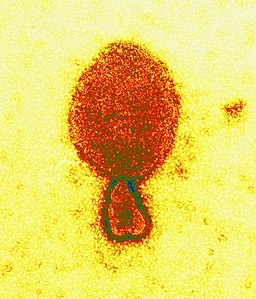User:Cbs8286: Difference between revisions
No edit summary |
|||
| Line 35: | Line 35: | ||
==Genome Structure== | ==Genome Structure== | ||
At the point and time of writing this,November 15th 2022, Langya henipavirus’s genome is unmapped and unknown. However, we have mapped and studied several other henipaviruses such as the well known Nipah henipavirus and Hendrah henipavirus. So to better understand Langya henipavirus I have included information about the genus. | |||
The Genus henipavirus genome is mononegaviral, Circular and around 18.2 kb in size, containing six protein production genes. Being a virus, it contains only a RNA strand and no chromosomes. The Henipavirus genus must follow a “rule of six”. Meaning that its genome must be a multiple of 6, if a mutation or incomplete genome synthesis occurs that deviates from this rule then they will be unable to replicate properly. (Kolakofsky et al. 1998). | |||
Another interesting feature is its means of protein synthesis. Hepinaviruses uses co-transcriptional mRNA editing during transcription of the phosphoprotein gene to generate multiple protein synthesizing mRNAs from a singular gene. (Lo et Al. 2009). | |||
==Cell Structure, Metabolism and Life Cycle== | ==Cell Structure, Metabolism and Life Cycle== | ||
Revision as of 21:48, 15 November 2022

Classification
Viruses; Riboviria; Orthornavirae; Negarnaviricota; Haploviricotina; Monjiviricetes; Mononegavirales; Paramyxoviridae; Orthoparamyxovirinae; Henipavirus; unclassified Henipavirus
Species
|
NCBI: [1] |
Langya henipavirus
Description and Significance
Describe the appearance, habitat, etc. of the organism, and why you think it is important.
Genome Structure
At the point and time of writing this,November 15th 2022, Langya henipavirus’s genome is unmapped and unknown. However, we have mapped and studied several other henipaviruses such as the well known Nipah henipavirus and Hendrah henipavirus. So to better understand Langya henipavirus I have included information about the genus.
The Genus henipavirus genome is mononegaviral, Circular and around 18.2 kb in size, containing six protein production genes. Being a virus, it contains only a RNA strand and no chromosomes. The Henipavirus genus must follow a “rule of six”. Meaning that its genome must be a multiple of 6, if a mutation or incomplete genome synthesis occurs that deviates from this rule then they will be unable to replicate properly. (Kolakofsky et al. 1998).
Another interesting feature is its means of protein synthesis. Hepinaviruses uses co-transcriptional mRNA editing during transcription of the phosphoprotein gene to generate multiple protein synthesizing mRNAs from a singular gene. (Lo et Al. 2009).
Cell Structure, Metabolism and Life Cycle
Interesting features of cell structure; how it gains energy; what important molecules it produces.
Ecology and Pathogenesis
Habitat; symbiosis; biogeochemical significance; contributions to environment.
If relevant, how does this organism cause disease? Human, animal, plant hosts? Virulence factors, as well as patient symptoms.
References
[Murugesu, Jason Arunn (10 August 2022). "Langya virus: How serious is the new pathogen discovered in China?". New Scientist. Retrieved 13 August 2022.] [Lu, Donna (10 August 2022). "Newly identified Langya virus tracked after China reports dozens of cases". The Guardian.]
Author
Page authored by Breeze Smith, student of Prof. Bradley Tolar at UNC Wilmington.
